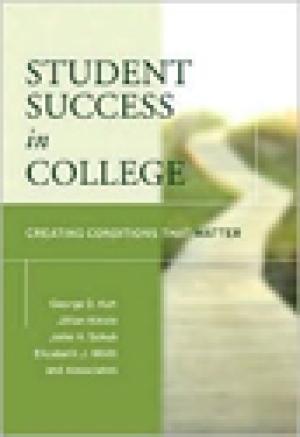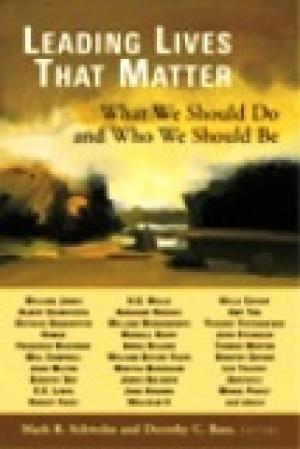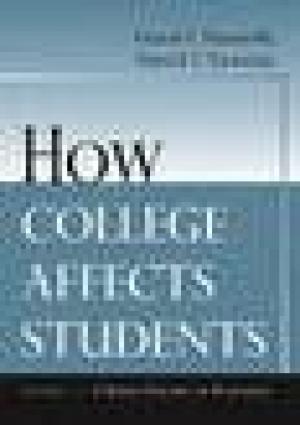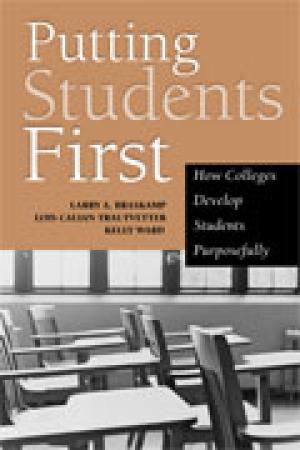Resources

This book describes policies, programs, and practices that a diverse set of schools have used to promote student success, and shows how other schools can use them to improve student success in their context. Based on the Project DEEP (Documenting Effective Educational Practices) study, this book will provide concrete examples of what different types of institutions can do to help different types of students succeed in college at higher rates. The broad spectrum of schools make the book applicable across institutional type, showing readers how to encourage a variety of desired outcomes including student satisfaction, persistence, learning and personal development. Coordinated by the NSSE Institute for Effective Educational Practice a the Indiana University Center for Postsecondary Research, the project was co-sponsored by the Carnegie Foundation for the Advancement of Teaching, the Pew Forum on Undergraduate Learning, and supported by grants from the Lumina Foundation and the Center for Inquiry in the Liberal Arts at Wabash College. (From the Publisher)

Leading Lives That Matter draws together a wide range of texts---including fiction, autobiography, and philosophy---offering challenge and insight if you're thinking about what to do with your life. Instead of prescribing advice, Schwehn and Bass approach the vocational process as an ongoing conversation. They include in this conversation some of Western tradition's best writings on human life---its meaning, purpose, and significance---ranging from ancient Greek poetry to contemporary American fiction. Including Tolstoy's novella The Death of Ivan Illych as an extended epilogue, Leading Lives That Matter will help you clarify and deepen how you think about your own life. Includes works by Aristotle, Dietrich Bonhoeffer, Frederick Buechner, Willa Cather, Dorothy Day, Annie Dillard, Robert Frost, Abraham Heschel, Thomas Lynch, John Milton, Martha Nussbaum, Theodore Roosevelt, Dorothy Sayers, Amy Tan, William Butler Yeats, and many more. (From the Publisher)
Journal Issue.
This essay argues that teachers would be more effective at promoting students' willingness to work hard at course content that seems to them remote and abstract if teachers explicitly presented that content to students more as a means to their education rather than as the aim of their education. Teachers should confront the fact that most of the content they teach will be forgotten by students. Once this fact is accepted, then it follows that teaching content that teachers know will be forgotten as if it should never be forgotten is myopic and perhaps dysfunctional. An alternative teaching model is to use course content to stimulate the flourishing of developmental human skills--rationality, language, aesthetic responsiveness, imagination, introspection, moral and ethical deliberation, sociability, and physicality--in the service of a developmental notion of liberal education that can never go out of date and can never be forgotten because its effects become absorbed as developmentally advanced orientations of life, not crammed into short-term memory for the sake of passing tests.

How College Affects Students, Volume 2 is the long awaited sequel to the landmark work that was first published in 1991. Offers the most comprehensive resource available on what is known about the effect of college on students. In this book, Pascarella and Terenzini provide current information and empirical research from the decade since their first book was published which distills what is know about how students change and benefit as a consequence of attending college. (From the Publisher)
Biblical studies professors in Christian liberal arts colleges typically face greater hostility from students nurtured in fundamentalist churches than they do from those who attend mainline churches. Guiding them through their first academic study of the Bible poses many challenges. To avoid the course becoming a battlefield, and to facilitate integration on a higher level, the Wesleyan Quadrilateral provides a middle way between right-wing and left-wing extremes. This approach gives priority to the Bible as the primary source for determining theology and practice, but relies heavily on tradition, reason, and experience as well. It also promotes interaction with the spiritual, moral, and ethical concerns expressed in the biblical texts. To adopt the Quadrilateral involves active concern for character formation, inspiring students to become better people. If we merely dispense historical-critical or literary information without considering contemporary relevance, we bore students and fail in our duties as educators.
This essay chronicles the academic odyssey of a young professor who sets out to revise the department's Introduction to Religion course only to realize that she must first clarify her vocational commitments before she can create a teachable course. She is convinced through working with many students who express disdain or even hostility toward the subject matter that she wants to model a relationship to the subject matter that says religion matters, but is uncertain how to do this. After an autobiographical foray into her academic upbringing in active learning, the author articulates four values to model in her teaching: personal relevance, academic responsibility, ethics, and community. The author then engages current scholarship in active learning, and narrates the process of translating those four values into concrete course goals and particular assignments. The essay concludes with an assessment of teaching the revised course.
After the disheartening results of an informal investigation of content knowledge and reading comprehension among her students, the author ponders the implications for her teaching objectives. What are we, as educators in religious studies, really teaching and how are we doing it? How are we accommodating students with less traditionally honed academic skills without diminishing content? She describes her experiments with several new teaching strategies for enhancing student learning by helping them improve basic skills, develop cultural literacy, and relate course content to their personal experience.
This study ventures to sketch the dimensions of stress in religious thinking among young Muslims studying theology in Turkish universities and the ways in which these tensions are handled in educational institutions. As a result of a review of related literature, together with the use of a questionnaire with 382 respondents and interviews with 15 participants, the extent of experienced intense religious stress, the source, the content, the ways of resolution, the duration, and the period of religious stress were identified. Finally, the cognitive, educational, theological, and socio-cultural challenges to which young Muslims were exposed were delineated and possible ways to overcome these problems were outlined, with some suggestions for educational settings.

Society is calling for higher education to take more responsibility for helping students find purpose and meaning in life. In this book, the authors argue that colleges should purposefully invest in students in ways that will foster their holistic development by recognizing and building on students' purpose in life, intellectually, spiritually, and morally. By using the "4C framework"— culture, curriculum, cocurriculum, and community— faculty, student affairs staff, and academic administrators will be able to discuss, plan, and create a college environment that effectively supports the learning and development of students. The book contains a set of themes and calls for consideration and action based on the findings of site visits at 10 colleges and a set of questions to help readers think about and plan how to develop students holistically on their own campuses. (From the Publisher)